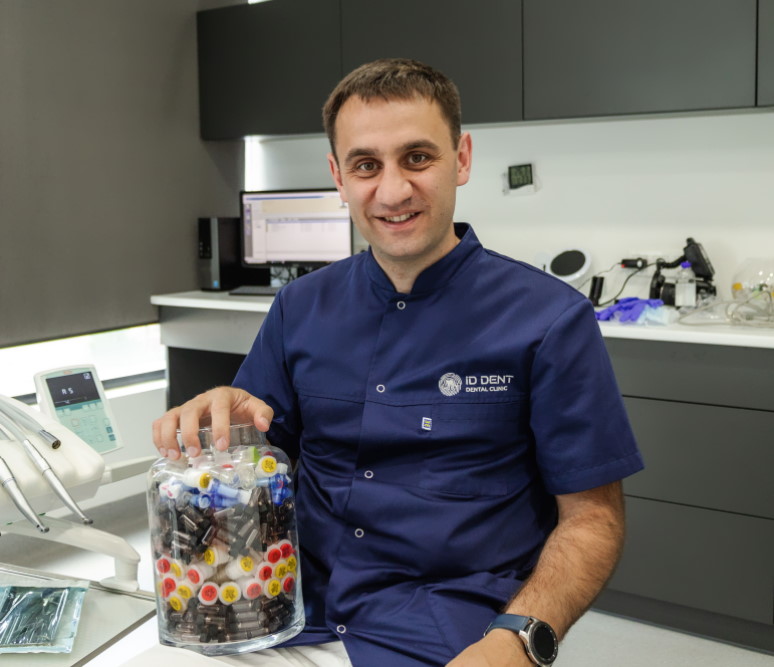Single Tooth Implantation
If you need a single tooth implantation, don’t waste time looking elsewhere. Contact ID Dent! We do everything for quality and safety! You will be satisfied with the result and the treatment process altogether.
| Service Type | Dental |
| Healing Period | 4-6 months |
| Quality of Life | Improved |
| Rehabilitation | Follow implant application |
| Aesthetic | Natural marking |
| Functionality | Restoration |

Losing a tooth can significantly affect our confidence, smile aesthetics, and the ability to speak and chew normally. However, thanks to modern dental methods, restoring a missing tooth has become easier and more effective. Single tooth implantation... Read more
Losing a tooth can significantly affect our confidence, smile aesthetics, and the ability to speak and chew normally. However, thanks to modern dental methods, restoring a missing tooth has become easier and more effective. Single tooth implantation is one of the most common and successful methods. It allows restoring a missing tooth without impacting adjacent teeth.
The single tooth implantation process includes installing an artificial root (implant) in the jawbone, on which a crown – the artificial part of a tooth – is fixed after some time. This procedure is usually carried out under local anesthesia and is almost painless.
Our dental clinic offers high-quality services for single tooth implantation to restore your smile and functionality. Sign up for a consultation at ID Dent to begin treatment soon.

The loss of even a single tooth is a serious problem that can lead to various complications: from speech disorders, aesthetic defects to the development of periodontal diseases and teeth shifting. Dentistry offers an effective and long-lasting solution – implantation. A single tooth implantation is a surgical procedure where an implant is placed into the jawbone, later topped with an artificial crown. This technique restores the function and aesthetics of the lost tooth.
Features and Benefits of Tooth Implantation
Implanting one tooth is an investment in your health and beauty. The method has become popular due to several significant advantages:
- implants look natural and perform chewing functions well;
- full chewing function is restored;
- prevents bone tissue atrophy after tooth loss;
- implants can last for many years with proper care;
- does not require grinding of adjacent teeth, as with bridge prostheses;
- high resistance to loads and mechanical stress.
Implantation is about reliability. This technique meticulously restores esthetics and returns the functionality of a tooth. Innovative materials, constantly improving, allow selecting the best option for each patient, considering their wishes and anatomical features. And the result will last for many years – of course, provided you follow your dentist’s recommendations.
Indications for Single Tooth Implantation
Implantation with installation would be the best solution in the following cases:
- loss of one tooth due to injury or disease;
- significant destruction of the tooth that cannot be restored by other methods;
- congenital absence of a tooth (agenesis);
- inability to use bridge prostheses due to lack of supporting teeth.
If you plan to restore a single tooth using an implant, you need to contact a clinic. During the consultation, the doctor will thoroughly examine the oral cavity, assess bone tissue parameters and choose the best treatment method, considering individual characteristics.
Contraindications to the Procedure
Contraindications for implantation of one tooth are divided into absolute and relative. Absolute contraindications are:
- severe systemic diseases (like uncontrolled diabetes);
- oncology;
- severe osteoporosis;
- inability to undergo general anesthesia.
Relative contraindications include:
- insufficient bone tissue volume;
- inflammatory processes in the oral cavity;
- periodontitis in an acute stage;
- allergic reactions to implant materials.
Relative contraindications can be managed. Firstly, eliminate the limitation – for instance, adjust bone volume, treat inflammation and periodontitis, select other materials. After this, implantation can proceed.
Methods of Tooth Implantation
Two main methods are used for tooth implantation: single-stage and two-stage implantation. Both methods have their features and indications depending on the patient’s oral condition and the desired outcome.
- Single-stage implantation. The implant is installed and the temporary crown is fixed during one visit. This method allows fast restoration of a lost tooth, minimizing the number of visits to the doctor;
- Two-stage implantation. The implant is first placed in the bone, followed by a healing period (usually 3-6 months), after which a permanent crown is fixed. This method ensures high predictability and reliability, especially in complex clinical cases.
The choice between single-stage and two-stage implantation depends on the clinical situation, the time the patient is willing to spend, and their preferences. Single-stage implantation suits those who want a quick tooth restoration but the two-stage procedure is often applied for maximum stability and durability of the result. The decision on the method should be made jointly with a skilled dentist, considering all individual characteristics and treatment goals.
Stages of Single Tooth Implantation
Single tooth implantation includes several main stages ensuring a successful outcome:
- Consultation and Diagnosis. The doctor examines your oral cavity, gathers medical information, and performs an X-ray or CT to assess your bone’s condition and plan the surgery.
- Treatment Planning. Based on the examination, the doctor develops a treatment plan, selects the implant type, and determines how and where it will be installed.
- Implant Installation. During the operation, the implant is embedded in the jawbone where the lost tooth was. The operation is performed under local anesthesia or general anesthesia, depending on the situation and patient preferences.
- Healing and Osseointegration. After implant installation, time is needed for the implant to integrate with the bone, a process taking weeks to months.
- Abutment and Crown Installation. Once the implant has integrated well with the bone, an abutment is placed, connecting the implant to the crown. Then, a permanent crown is installed, restoring the appearance and function of the tooth.
- Follow-up Visits. After completing implantation, regular visits to the doctor are necessary to monitor the implant and surrounding tissues. Following care recommendations is crucial for longevity.
These stages ensure a systematic and safe procedure execution, achieving reliable and aesthetic results.
Post-Implantation Tooth Care
Following implantation, meticulous oral hygiene is important to ward off infection and inflammation risks. It’s simple – maintain cleanliness around the implant with a toothbrush and paste twice a day, floss, and mouthwash after every meal. Patients are also advised to avoid hard and sticky foods that might damage temporary crowns or the implant. Regular dental visits for control and professional cleaning will ensure long-term success and oral health preservation.
How is the Price of Single Tooth Implantation Formed?
The cost of single tooth implantation depends on various factors, including chosen implant type, procedure complexity, region, and the doctor’s qualification. The table below outlines the main factors affecting cost:
| Factor | Cost Impact |
|---|---|
| Implant Type | Influences cost (different brands have different prices) |
| Bone Tissue Volume | The need for bone grafting increases cost |
| Doctor’s Qualification | Highly qualified specialists cost more |
| Region | Prices vary by region. In the capital, dental services can be more expensive |
| Additional Procedures | Cavity treatment, tooth removal, tests |
With so many factors affecting the price, it’s impossible to precisely state what a single tooth implantation costs. The sum is calculated after a consultation and creating a personalized treatment plan.
Single Tooth Implantation at ID Dent
The foundation of successful implantation is a qualified doctor. Such dentists work at the private dental clinic ID Dent in Lesnoy massif, Kyiv. Our doctors possess the highest qualification level and mainly listen to patients and strive to help them. The dental center is equipped with the latest equipment, using European implant systems from trusted brands. The pricing policy is democratic. Our main advantage is an impeccable reputation. This is a clinic recommended to loved ones.
Visit ID Dent on the Left Bank of Kyiv (near Lesnaya and Chernihivska metro stations)! A consultation requires a prior appointment.
Frequently asked Questions
How much does single tooth implantation cost?
The cost varies depending on the complexity of the clinical case and the chosen type of implant. Approximate prices can be found on ID Dent's website.
Why choose a single tooth implantation?
Single tooth implantation ensures durability, stability, and a natural appearance without requiring grinding of adjacent teeth as with bridge prostheses.
How is the single tooth implantation procedure carried out?
Before treatment begins, the doctor will consult with you, explain the projections, then perform diagnostics, rule out contraindications, and develop a treatment plan. An implant is then inserted into the bone, followed by a healing period. Finally, a permanent crown is placed.
Does implanting a single tooth hurt?
The procedure is performed under local anesthesia, so you won't feel pain. After the operation, there might be slight discomfort, alleviated by analgesics.
How long does the recovery take?
The initial healing period lasts several days, while complete osseointegration takes several months. Avoid excessive loads on the implant during healing.
What are the risks associated with a single tooth implantation procedure?
Infection can develop, in rare cases, the implant may be rejected or adjacent teeth can be damaged. Maintain hygiene and follow your dentist's instructions to avoid risks.
How long do implants last?
With proper care and adherence to your dentist's instructions, implants can last decades.
How to care for an implant?
Caring for an implant is similar to caring for natural teeth: daily brushing, using dental floss and rinses, and timely preventive check-ups at the dentist.

 Kyiv, st. Bratislavskaya 14B
Kyiv, st. Bratislavskaya 14B Mon.-Fri. 9-20, Sat.-Sun. 10-18
Mon.-Fri. 9-20, Sat.-Sun. 10-18



